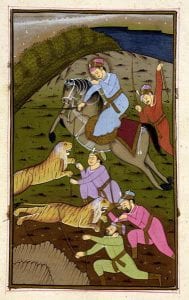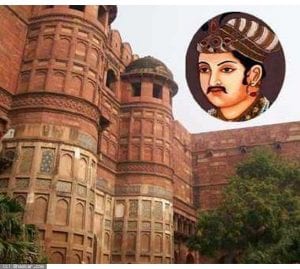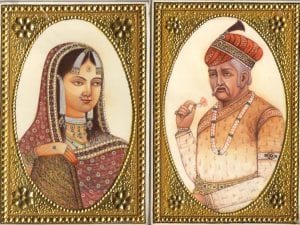The rustling pages of history still have the name, Majestic and magnificent. The story of a person who captured the country effortlessly. Not just the land but the hearts too. There is no one person who could match his intelligence. Even though multiple pages of history have evaluated aspects of his life, some of the facts about this Mughal master have not yet come to public picture. Every book explains how great an emperor he was, but there was more than just that to Akbar. So here we present the 10 interesting life facts about Akbar, the greatest of Mughal emperors.
-
The Shikar
A courageous hunter since his young days, Akbar feared nothing even in the deadliest jungles. He was passionate about hunting and loved to go for hunting tours across his empire during the peace times. Although Akbar set out hunting with his royal trustees as company, he preferred playing in the ground on his own. He also had the habit of tranquilizing animals and getting them delivered to neighboring states as a token of love. One famous theory also says that Akbar was wounded badly during one such hunting session, eventually causing his death.
-
The intellectual
Akbar filled his court with intellectuals who were chosen with great care. He loved and cherished the company of such intellectual people and religious leaders. It is because of this that his court was graciously blessed with the presence of talented and intellectual men of all times. The navratnas of his court are well known for their brilliance. As a child, he had spent majority of his time in exile and he was dyslexic. Yet, Akbar apart from learning to read and write also had a huge passion for art and literature.
-
Tolerance to other religions
This characteristic of Akbar remains one of the main reasons why he was accepted with due love by all his folks. Unlike his successors and predecessors, Akbar was biased to no particular religion. While he respected and followed his own, he treated the other religions with equal respect. Akbar also removed the taxes which were laid on Hindu pilgrims during visits to holy places. This characteristic stood as a great support for him to expand his territory. Akbar also founded the religion Din-e-Illahi in order the curb down religious differences.
-
Passion for Architecture
The Mughal rule has always held a proud position when it comes to its contribution to architecture. Akbar was hugely fond of architecture and has contributed to the world architectural masterpieces of complete brilliance and elegance. His successors like Jahangir and Shah Jahan also kept the skills alive by building many other masterpieces and adding them to the list of their accomplishments. Lahore palace, Fatehpur Shikri, Agra fort are some of the marvelous pieces build during Akbar`s reign.
-
The Warrior
Since childhood, Akbar grew up to be a very brave soul. He feared none. This aspect of him helped him in capturing his dreams of expanding his kingdom. He held in him all attributes a warrior will need and fought bravely. The second battle of Panipet is a historic evidence for the same. Hemu suffered severe defeat in the hands of Akbar during this war. He also successfully defeated Rana Pratap of Chittod, a great warrior then and captured his land.
-
Contribution to Coinage
As far as coinage and currency are concerned, Akbar played a huge role in innovating and changing the systems. Before his reign, the coinage system was almost non-existent and ineffective. While his predecessors focused only on conquests, Akbar shifted his attention to establishing a well-defined coinage system. The coins were used to reflect the love for art and culture in the state.
-
The Lover
Akbar was quite a romantic hero of his times. In his entire lifespan, he married over 36 women from different parts of the country. Also, these women belonged to different religions. Although these marriages had political reasons behind them, he always had love for the women he married. Among them, the most notable one is Jodha Akbar who was a Jaipur princess. It is believed that she handled much of administrative work in the palace.
-
The foodie
Akbar in his early stages was very much fond of food. Around forty dishes were served during each meal in his palace. He also preferred dining on his own except in cases of public banquets. The royal food from the kitchen arrived well covered by the cook for the fear of poison. The food would then be delivered to the palace eunuchs who in turn gave them to the serving girls.
Apart from these Akbar also had great love for pigeons. The palace housed over 20000 pigeons which were divided into 10 groups around the palace. They were trained well to act as per commands from the servants and eunuchs. Their flight in the palace was controlled by these servants using whistle.
While the list of characters that made him the greatest of his times goes long way, he does hold a record of having many cons too.
-
The Betrayer
Although history celebrates Akbar to be among the greatest kings of his time, betrayal during conquests was an inseparable part of him. Mughal Empire was left with a very weak foundation immediately after the death of Humayun. With the serious threats arriving from Afghan counterparts, Akbar at a very young age was left to prove himself as a ruler. Only under the regency of Bairam Khan did Akbar find his way to retaining the throne. Yet, after a few years, he got Bairam Khan executed fearing to lose his throne and married his wife.
-
Akbar`s palace bar
Although Akbar was a wonderful lover to his wives when it came to other subjects in his court it was quite the opposite. Akbar`s palace had a bar where courtiers used to take dancers from. They had to get his consent in order to take a virgin. He distributed sex slaves among his courtiers and is also said to have slept with countless women from the kingdom. It is also reported that around 5000 women stayed in Akbar`s palace.
Akbar`s reign is known as the Golden era of Mughal period. Not just a king, but Akbar was a ruler the world turned its head towards. He was among the first few to have thought about social reforms and despised acts such as sati and stood against such practices. This great emperor died in 1605 at the age of 63 and was then buried in a beautiful tomb in Agra. While he is no more, his greatness is still flourishing in the pages of history and irrevocably in our hearts.






